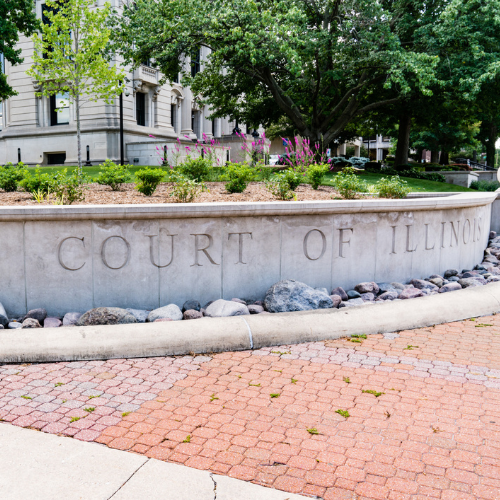June 2025 IICLE FLASHPOINTS
JUNE 2025 FOCUS AREAS
Condominium Law

Dismissal of Claims Against Allegedly Predatory and Cruel Purchasers Upheld
by Kenneth Michaels, Jr.
Employment & Labor

One Day Rest in Seven Act Amended To Prohibit Retaliation by Employers
by Thomas C. Garretson
Spotlight Author Matthew R. Davison

Our June 2025 FLASHPOINTS Author Spotlight recognizes Matthew R. Davison, who most recently served as a contributing author on ADULT GUARDIANSHIPS, ADVANCE DIRECTIVES, AND MENTAL HEALTH LAW (IICLE®, 2025). He has also written for previous editions of ADULT GUARDIANSHIPS, ADVANCE DIRECTIVES, AND MENTAL HEALTH LAW since 2018.
Read Full SpotlightFEATURED HANDBOOKS
FLASHPOINTS is a complimentary monthly newsletter featuring current legal updates and trending topics in various practice areas. IICLE®, a 501(c)(3) non-profit organization, produces materials like these to support the career growth of Illinois legal professionals. Thank you to our contributors, sponsors, and readers. For information about becoming an IICLE® contributor, please find resources located here.
Condominium Law
Dismissal of Claims Against Allegedly Predatory and Cruel Purchasers Upheld
The First District of the Appellate Court recently affirmed the dismissal of common-law claims for tortious interference with prospective economic advantage and defamation and statutory claims under the Real Estate License Act of 2000, 225 ILCS 454/1-1, et seq., against a real estate developer and two owners of a well-known residential and commercial real estate brokerage firm. 540 North Lake Shore Drive Condominium Ass’n v. MCZ Development Corp., 2025 IL App (1st) 230733. The last paragraph of the opinion really says it all as to the court’s frustration over the defendants’ alleged conduct.
Having found no error in the dismissal of all counts, we must affirm the judgment in all respects. We are aware that defendants' behavior here, as alleged (and much of which is not denied by defendants), constitutes capitalism at its most Darwinian — conduct that, if true, could best be described as predatory and even cruel. But given the unique circumstances in which it played out, plaintiff is unable to identify any actionable tort or statutory violation. By this ruling, we do not mean to countenance defendants' behavior, only to apply the law as we find it. 2025 IL App (1st) 230733 at ¶84.
To understand the facts in the case, it would be helpful to note that under §15 of the Illinois Condominium Property Act, 765 ILCS 605/1, et seq., all the condominium property within an association may be sold pursuant to approval of 75 percent of the unit owners (based up percentage ownership). In 2019, the City of Chicago increased the requisite approval to 85 percent of the unit ownership. Chicago Municipal Code §13-72-085. In this opinion the appellate court refers to 75 percent approval, which does not change the impact of any of the facts.
Facts
The plaintiff association administered a 149-unit, 7-story, condominium building in the Chicago neighborhood of Streeterville. 2025 IL App (1st) 230733 at ¶4. This meant that the condominium property was a prime candidate along Lake Shore Drive, amidst high-rise buildings, for redevelopment. Id. In 2016, the defendants allied together to purchase a sufficient number of units to prevent anyone else from being able to successfully purchase the condominium property through §15 of the Act. 2025 IL App (1st) 230733, ¶7. In 2017, the defendants began a campaign to contact unit owners in an effort to purchase other units within the building utilizing mass mailings, robo-calls, and disinformation to create an environment of panic and fear. 2025 IL App (1st) 230733 at ¶8. These tactics also included incentives such as paying sellers’ closing costs and then renting the units back to the sellers. Id. The defendants also allegedly spread disinformation about the building in the real estate brokerage community and threatened other interested developers. 2025 IL App (1st) 230733 at ¶9. According to the complaint, the defendants’ lies to third-parties included (1) representing that they owned 25 percent of the units at a time when they owned only 18 percent, and (2) representing that the association did not own the air rights above the building because they were owned by the first-floor commercial unit owner (which was not part of the condominium property). 2025 IL App (1st) 230733 at ¶10.
The association responded by voting to sell the condominium property and began efforts to market the property for sale. 2025 IL App (1st) 230733 at ¶12. According to the complaint, the defendants continued to increase their scare tactics and represented that they owned 25 percent of the condominium ownership so they could block any sale. 2025 IL App (1st) 230733 at ¶13. (At this time in 2018, the required percentage to approve a sale was still 75 percent.) The association adopted new rules regarding leasing units that were the subject of a separate lawsuit.
When the association’s broker advertised the building for sale in April 2018, Crain’s Chicago Business published an article quoting one of defendants’ lawyers to the effect that no sale would be possible given defendants’ ownership. The association alleged that this article essentially resulted from a call to a Crain’s reporter. 2025 IL App (1st) 230733, ¶¶15 –16. In June 2018, defendants indicated that they would offer $47 million for the condominium property, which according to the association was tens of millions less than its worth. 2025 IL App (1st) 230733 at ¶17. In September 2018, the defendants finally reached the 25-percent ownership threshold. Prior to this time, nine potential buyers expressed an interest with five touring the building. According to the association, all buyers were scared away by defendants’ disinformation campaign. 2025 IL App (1st) 230733 at ¶18.
In November 2018, the association received a $68 million offer, which defendants informed everyone that they would reject as the building was not for sale. 2025 IL App (1st) 230733 at ¶19. In April 2019, the association received a $72 million offer, which failed to meet approval with 41 percent of the unit ownership voting against the offer. 2025 IL App (1st) 230733 at ¶20. At that time, defendants owned about 27 percent of the condominium property.
In 2018, the association filed a complaint in chancery against the real estate developer and its owner and a land trust alleging tortious interference and conspiracy. The complaint was dismissed and then on reconsideration amended. In 2020, the association also filed a complaint in the law division against the same defendants alleging torts. The law division case was consolidated into the chancery case, and eventually the claims from the law division case were dismissed. More defendants were added upon the filing of a second amended complaint. In response to a motion to dismiss, the court allowed the association to file a third amended complaint, the eventual dismissal of which led to the appeal here. 2025 IL App (1st) 230733 at ¶¶21 – 23.
The trial judge was the third one assigned to this case. In hearing a motion to dismiss brought by the new parties added to the case, the judge dismissed all claims against all defendants in a succinct order. 2025 IL App (1st) 230733 at ¶¶25 – 26.
Analysis
The appellate court exercised de novo review on the §§2-615 and 2-619 motion to dismiss. 2025 IL App (1st) 230733 at ¶29. The older defendants in the case challenged appellate jurisdiction because some of the claims such as defamation, slander of title, and conspiracy had been dismissed previously and the dismissals were not appealed timely from those dismissal orders. 2025 IL App (1st) 230733 at ¶32. The appellate court observed that there are essentially two kinds of consolidations. Sometimes, the consolidated cases are consolidated for a limited purpose to preserve their distinct identity and may even keep separate dockets. In such cases, the time to appeal starts when a final and appealable order is entered in that case. 2025 IL App (1st) 230733 at ¶33. More commonly is the consolidation of both cases into one, as happened here. The consolidation order stated that the law division case was consolidated into the chancery case “for all purposes.” 2025 IL App (1st) 230733 at ¶35.
Regarding the tortious interference claim, the appellate court observed that “[i]n the context of real estate, this court has held that the potential of buying a home does not ripen into an actionable expectation when, as is usually the case, the seller is free to accept arms-length offers from any buyer it chooses.” 2025 IL App (1st) 230733 at ¶40, citing Stefani v. Baird & Warner, Inc., 157 Ill.App.3d 167, 510 N.E.2d 65, 71, 109 Ill.Dec. 444 (1st Dist. 1987). The court observed that courts are reluctant to enforce a party’s expectations to consummate a potential sale. This is because potential business relationships fall apart for any number of reasons, and courts should “loath to inject commitments into those relationships that the parties have not yet made themselves.” 2025 IL App (1st) 230733 at ¶41. A second reason the court found that the association did not have a reasonable expectation of entering into a valid business relationship is that there was no showing that absent the defendants’ ownership and veto, the remaining owners would have voted to accept any particular offer presented. 2025 IL App (1st) 230733 at ¶44. The court distinguished Stefani, in which at least some counter-offers had been exchanged by the parties. “We recognize that this is the Association’s point — that defendants scared off the bidders — but that does not make the possibility of a sale any more concrete.” 2025 IL App (1st) 230733 at ¶45. However, the court was not rejecting other potential situations when a tortious interference claim may lie arising from real estate negotiations. “To be clear, we do not hold, as a bright-line rule, that no sale of real estate could ever be the subject of a claim for tortious interference with prospective economic advantage. Every case will present its unique facts. But the expectation here was not sufficiently concrete to rise to an actionable one.” [Emphasis in original.] 2025 IL App (1st) 230733 at ¶46.
The association challenged the trial judge’s dismissal of claims previously not dismissed by a predecessor judge in the case, claims that some defendants had answered. The appellate court rejected this challenge. A trial judge may reverse any interlocutory order, even a final judgment before it becomes appealable. This power to review, modify, or vacate any interlocutory order includes orders entered by another trial judge in a case. 2025 IL App (1st) 230733 at ¶48.
Regarding the defamation claim the appellate court recognized the claim as one defamatory per quod. The alleged false statements were that the defendants owned 25 percent of the property when they did not and that the association did not own air rights. 2025 IL App (1st) 230733 at ¶¶52 – 53. As such, the association was required to plead special damages, that is, actual damage of a pecuniary nature. 2025 IL App (1st) 230733 at ¶¶53 – 58. Under these facts, the association could never plead actual pecuniary losses.
For the same reason, the association could not prove a claim for slander of title. 2025 IL App (1st) 230733 at ¶63. Also, given that the tort claims were dismissed, the association’s claim for conspiracy necessarily dismissed as nonexistent. 2025 IL App (1st) 230733 at ¶64.
The trial court held that the License Act did not create a private cause of action. 2025 IL App (1st) 230733 at ¶70. Regarding the association’s claims against two licensed real estate brokers under the Real Estate License Act of 2000 for making false statements. The allegations were that these statements violated §15-25(a) of the License Act, which provides that “[l]icensees shall treat all customers honestly and shall not negligently or knowingly give them false information.” 2025 IL App (1st) 230733 at ¶71. Regarding whether the statements as to ownership of 25 percent, the appellate court found that there could be no construction in which, assuming the brokers made these statements, the brokers were making these statements as licensees to their customers, and therefore no action would lie for violating the License Act. 2025 IL App (1st) 230733 at ¶¶72 – 76. As to statements allegedly made to unit owners to induce them to sell their units, the association would have no standing to assert such claims. 2025 IL App (1st) 230733 at ¶¶77 – 81. While the association has standing to represent unit owners, it has no standing to assert claims on behalf of former unit owners. 2025 IL App (1st) 230733 at ¶81.
The appellate court affirmed dismissal of the complaint.
For more information about condominium law, see CONDOMINIUM LAW: GOVERNANCE, AUTHORITY, AND CONTROLLING DOCUMENTS (IICLE®, 2024). Online Library subscribers can view it for free by clicking here. If you don’t currently subscribe to the Online Library, visit www.iicle.com/subscriptions.
Corporate & Commercial
An In-Depth Look at the Amendments to the UCC: Emerging Technologies and Controllable Electronic Records
Adopted by a total of 30 states to date, including Illinois in August 2024, the amended Article 12, Controllable Electronic Records, of the Uniform Commercial Code (UCC), 810 ILCS 5/1-101, et seq., addresses commercial transactions involving novel business entities referred to as decentralized autonomous organizations (DAOs) as well as emerging distributed ledger technologies, also called blockchains, and the digital assets that are transacted on blockchains, such as cryptocurrencies, nonfungible tokens (NFTs), smart contracts, and the digital wallets used in online commerce. To a limited extent, the amendments also address issues related to artificial intelligence. The amendments revised most of the Articles of the UCC and added a new Article 12 primarily addressing certain digital assets.
Like the UCC in general, the amendments establish only state commercial law rules. The new UCC provisions do not directly amend any federal laws or regulations, state taxation of digital assets, or money transmitter or anti-money laundering laws, whether state or federal. The amendments defer to law outside of the UCC with respect to those matters.
The amendments respond to market concerns about the absence of definitive commercial law rules for transactions involving digital assets and address other technological developments affecting electronic chattel paper, negotiable instruments, payment systems, documents of title, and sales and leases of goods. In particular, the amendments clarify the scope of Articles 2 (Sales) and 2A (Leases) when transactions combine the sale or lease of goods with other matters, a topic of importance in transactions affected by emerging technologies.
Article 12 Overview
The new UCC Article 12 governs the transfer of property rights in certain intangible digital assets (“controllable electronic records”) that have been or may be created and may involve the use of new technologies. These assets include, for example, certain types of (non-fiat) virtual currency and NFTs. The new provisions will help facilitate the use of digital assets as collateral for loans, among other benefits.
The concept of “control” with respect to digital assets is best understood in a general sense as a functional equivalent to “possession” of a traditional asset. Accordingly, control is a necessary condition for protection as a good-faith purchaser for value (a “qualifying purchaser”) of a controllable electronic record. Article 12 confers an attribute of negotiability on controllable electronic records because a qualifying purchaser takes its interest free of conflicting property claims to the record.
NOTE: The words “negotiable” and “negotiability” take on a unique meaning under the UCC, but instruments can generally be said to be “negotiable” if they facilitate the unconditional promise or order to pay a fixed amount of money, are payable to the bearer, are payable on demand or at a definite time, and do not state any other undertaking or instruction by the person promising or ordering payment to do any act in addition to the payment of money. While the UCC does not directly define the words negotiable or negotiability, the concept is defined and applied within specific contexts, most notably in Article 3 (Negotiable Instruments) (UCC §3-104) and Article 7 (Documents of Title) (UCC §7-104), and now, in a similar fashion, in Article 12 (Controllable Electronic Records) (UCC §§12-104 and 12-105). The UCC uses the terms “negotiable” and “negotiability” as terms of art, with their meaning and application determined by the context of the specific article and section.
Controllable electronic records also provide a mechanism for evidencing certain rights to payment — controllable accounts and controllable payment intangibles. An account debtor (obligor) on such a right to payment agrees to make payments to the person that has control of the controllable electronic record that evidences the right to payment. Assignments and other aspects of these rights to payment are governed by revisions to UCC Article 9 and Article 12. Because a “qualifying purchaser” of a controllable account or controllable payment intangible will take free of competing property claims, these rights to payment also would have this attribute of negotiability. Article 12 provides special rules with respect to the payment obligations and conditions of discharge of account debtors on controllable accounts and controllable payment obligations.
Article 12 also includes a choice-of-law rule for the matters that it covers in connection with transactions in controllable electronic records. A record is information that is retrievable in perceivable form. UCC §1-201(b)(31) (defining “record”). A controllable electronic record is a record that is stored in an electronic medium and that can be subjected to “control,” as defined in §12-105. See UCC §§1-201(b)(16A) (defining “electronic”); 12-102(a)(1) (defining “controllable electronic record”). The electronic record must have some “use” or benefit that one person can enjoy and can exclude all others from enjoying, e.g., the power to “spend” a Bitcoin (or, more precisely, the power to include an unspent transaction output (a UTXO) in a message that the Bitcoin protocol will record to its blockchain).
A person must be able to transfer to another person this exclusive power to use and the exclusive power to transfer the electronic record. To remain exclusive, the transfer must divest the transferor of the power to use the electronic record. A person must be able to demonstrate to others that the person has the power to use and transfer control of the electronic record. Control also serves as a method of perfection of a security interest in a controllable electronic record and as a condition for achieving a non-temporal priority of a security interest. The meaning of “control” in the UCC depends on the type of property involved. See UCC §§7-106 (electronic documents of title); 8-106 (four different types of investment property, each with a different definition of “control”); 9-104 (deposit accounts); 9-105 (chattel paper); 9-105A (electronic money). The Comments to UCC §12-105 explain the requirements for obtaining control of a controllable electronic record.
The language introduced in the 2022 amendments applies not only to existing electronic (intangible) assets that are currently in use, but they also aspire to apply to electronic assets that may be created using technologies that have yet to be developed or even imagined.
Section 12-104(d) of the UCC adopts the “shelter” principle, under which a purchaser of a controllable electronic record acquires whatever rights the transferor had or had power to transfer. A similar rule appears in Articles 2, 3, 7, and 8. See §§2-403(1) (goods); 3-203(b) (negotiable instruments); 7-504(a) (documents of title); 8-302(a) (certificated and uncertificated securities). The ability to take a controllable electronic record free of third-party property claims appears to be necessary for a controllable electronic record to have commercial utility.
Consider an example in which B contracts to buy Bitcoin from S:
Law other than Article 12 generally would determine whether S is the owner of the Bitcoin. Law other than Article 12 would resolve issues concerning the formation of the contract of sale between B and S and the obligations of the parties under the contract. Except to the extent provided by Article 12, law other than Article 12 would determine what steps are necessary for Bto acquire rights in the Bitcoin. By acquiring rights in the Bitcoin by sale, B would become a purchaser of the Bitcoin within the meaning of UCC Article 1. Article 12 provides that if B becomes a purchaser, B will acquire whatever rights S had or had power to transfer. As a general matter, law other than Article 12 would define these rights. B would acquire these rights regardless of whether B obtained control of the Bitcoin.
In this example, law other than Article 12 includes UCC Article 9, which determines the steps necessary for a security interest to attach to a controllable electronic record. More generally, Article 9 governs any conflict between Article 9 and Article 12. UCC §12-103(a).
Now assume that O is the owner of the Bitcoin and that S is a hacker, who acquired control of the Bitcoin illegally from O.
Just as a buyer of goods can obtain possession from a seller that has no rights in the goods, B can obtain control of the Bitcoin, even if S “stole” it from O. If B obtains control of the Bitcoin for value, in good faith, and without notice of any claim of a property interest, B would be qualifying purchaser. Even if B would not have acquired any rights in the Bitcoin under non-Article 12 law (for example, because S, a “thief,” had no rights to give), as an Article 12 law qualifying purchaser, B would acquire the Bitcoin free of all claims of a property interest in the Bitcoin. S’s control of the Bitcoin gave S the power to transfer rights to a qualifying purchaser, such as B. Even if O could locate B, B would defeat O’s claim of ownership and own the Bitcoin free and clear. (The same result would obtain if B bought a non-digital negotiable instrument from a thief under circumstances in which B became a holder in due course. This distinguishes “negotiable” property from property such as goods, as to which a buyer from a thief normally obtains no rights).
The general rule under UCC §12-107(a) is that the local law of a “controllable electronic record’s jurisdiction” governs matters covered by Article 12. The controllable electronic record’s jurisdiction is determined by an express provision in the record or in the system in which the record is recorded. If not so designated, it is determined based on the designation of the law governing the record or the system generally. Absent any such designations, at the bottom of this “waterfall” of alternatives, the governing law will be that of the District of Columbia. UCC §12-107(b) provides an exception for the rights and duties of account debtors under UCC §12-106 if an agreement between the account debtor and an assignor of the record provides for the law of another jurisdiction to govern those rights and duties.
The law of the controllable electronic record’s jurisdiction also governs perfection and priority of security interests in controllable electronic records, controllable accounts, and controllable payment intangibles. Perfection by filing, however, is governed by the law of the location of the debtor. See UCC §9-306B.
Scholarly Disputes Over Language
Article 12 creates a new exception to the nemo dat principle (“no one can give what they do not have”) by defining the term “qualifying purchaser” to mean “a purchaser of a controllable electronic record or an interest in a controllable electronic record that obtains control of the controllable electronic record for value, in good faith, and without notice of a claim of a property right in the controllable electronic record.” See UCC §12-102(a)(2). Critics of the language argue that under circumstances in which a thief or hacker acquires possession of a controllable electronic record (i.e., a void title interest), the definition of “qualifying purchaser” leaves to other law the question of whether any interest in property rights is initially acquired by the transferee of record. How would it be possible for the hacker to transfer any interest at all?
Critics also contend that since no other law would provide an exception to the notion that a thief cannot pass any sort of property interest, it naturally follows that a person who takes a controllable electronic record from a hacker would not be participating in a transaction that creates an interest in property. Accordingly, the critics argue that such a person could not be a “purchaser” and, thus, should not be able to qualify as a “qualifying purchaser.”
Within the context of “purchasers,” the UCC does allow for title to transfer from a thief to a “good-faith purchaser” pursuant to the good-faith purchaser doctrine (UCC §2-403), which holds that a transferee who acquires property in good faith, for value, and without notice of any defects or claims to the property can obtain a better title than the transferor.
The UCC does, however, incorporate the good-faith purchaser doctrine through the “holder in due course” language contained in Article 3. The holder in due course doctrine is a specific application of the good-faith purchaser doctrine within the context of negotiable instruments. See UCC §3-302. A holder in due course is a person who acquires a negotiable instrument for value, in good faith, and without notice of any defects or claims. Moreover, the holder in due course doctrine provides that a holder in due course takes the instrument free from many defenses and claims that could be asserted against the transferor, thereby ensuring the negotiability and reliability of such instruments.
The critics propose that the drafters should have chosen a term other than “purchaser” to describe the beneficiary of Article 12’s take-free rule. More specifically, the critics suggest that the drafters should have utilized the term “qualifying holder” instead of “qualifying purchaser,” consistent with the UCC’s holder in due course doctrine. The critics contend that such a change would align the statutory language of Article 12 with the rest of the UCC.
Revisions to the UCC’s Secured Transactions Article
The 2022 amendments to the UCC further extensively revise Article 9 to conform and adapt to Article 12. The first notable change to Article 9 involves the addition of two new kinds of collateral: controllable account (a subset of account) and controllable payment intangible (a subset of payment intangible, which is a subset of general intangible). See UCC §§9-101(a)(27A), 9-101(a)(27B). A controllable account or controllable payment intangible is created when the account or payment intangible is evidenced by a controllable electronic record, which results if the account debtor obligated on the account or payment intangible has agreed to pay the person in control of the controllable electronic record.
Perfection of a security interest in a controllable electronic record, controllable account, or controllable payment intangible may be by control or by filing a financing statement. Control of a controllable electronic record is determined under UCC §12-105. Control of a controllable account or controllable payment intangible is achieved by obtaining control of the controllable electronic record that evidences the account or payment intangible. See UCC §9-107A(b). A security interest in a controllable account, controllable electronic record, or controllable payment intangible that is perfected by control has priority over a security interest held by a secured party that does not have control. See UCC §9-326A.
According to the drafters, as is the case for secured parties protected by take-free rules under other articles, the rights of a secured party that takes free of competing property interests under UCC §12-104(e) or that is protected from certain actions under UCC §12-104(g), as a qualifying purchaser of a controllable account, controllable electronic record, or controllable payment intangible, are respected under Article 9. See UCC §9-331.
The governing law applicable pursuant to UCC §12-107 governs perfection by control and priority of a security interest in a controllable account, controllable electronic record, or controllable payment intangible. See UCC §9-306B(a). The law of the jurisdiction in which a debtor is located governs perfection by filing (but not by priority) for such collateral. UCC §9-306B(b).
The second notable change to Article 9 in the 2022 amendments addresses issues with respect to transactions in chattel paper. These changes primarily focus on (1) eliminating uncertainty concerning the definition of “chattel paper” and (2) clarifying the distinction between “tangible chattel paper” and “electronic chattel paper.” See UCC Comment 5.b, 810 ILCS 5/9-102.
As to the definition of “chattel paper,” the prior definition created uncertainty in “bundled” or “hybrid” transactions in which monetary obligations exist not only under a lease of goods but also with respect to other property and services relating to the leased goods, such as sale-leaseback transactions. Frequently, the value of the non-goods aspect of a transaction is substantially greater than the value of the lessee’s rights under the lease of goods. Uncertainty existed among those who finance chattel paper and other rights to payment as to whether these transactions give rise to chattel paper. The revisions resolve this issue by treating only those transactions whose predominant purpose was to give the obligor (lessee) the right to possession and use of the goods as giving rise to “chattel paper.” Some similar issues arise in connection with chattel paper that includes a security interest securing specific goods.
As to the distinction between “tangible chattel paper” and “electronic chattel paper,” the 2022 amendments address problems relevant to cases of multiple originals of writings as well as situations in which separate writings covered different components of chattel paper. With respect to electronic chattel paper, the safe harbor for control created in the 1998 revision to the UCC was based on a “single authoritative copy” of the chattel paper. Moreover, in some situations tangible chattel paper is converted to electronic chattel form and electronic chattel paper is converted to tangible form. Additional uncertainty existed when one or more records comprised one or more authoritative tangible copies of the records that evidenced the right to payment and rights in related property and one or more authoritative electronic copies of those records also existed.
Under the revisions to Article 9 under the 2022 amendments, the UCC provides a single rule, under which a security interest in chattel paper can be perfected by taking possession of the authoritative tangible copies, if any, and obtaining control of the electronic authoritative copies, if any. This single rule addresses cases when some records evidencing chattel paper are electronic and some are tangible or when a record in one medium is replaced by a record in another.
The 2022 revisions to Article 9 also define “chattel paper” more accurately, as the right to payment of a monetary obligation that is secured by a security interest in specific goods or owed under a lease of specific goods, if the right to payment and interest in the goods are evidenced by a record. UCC §9-102(a)(11).
Other Revisions
UCC §1-201(b)(24) defines “money” as including “a medium of exchange that is currently authorized or adopted by a domestic or foreign government.” There is no way of knowing how money in an intangible form might develop, but there are indications that some countries might authorize or adopt intangible tokens as a medium of exchange and others might authorize or adopt deposit accounts with a central bank as money. For example, the countries of El Salvador and the Central African Republic have adopted Bitcoin as their official currencies.
In many contexts, there is no need for the UCC to distinguish among types of money, but within the context of Article 9 and secured transactions, distinctions must be drawn. Only tangible money is susceptible to perfection by possession. Moreover, the steps needed for perfecting intangible tokens (such as controllable electronic records) by control are insufficient for perfecting an interest in deposit accounts with a central bank. For this reason, the revisions provide an Article 9 definition of “money” that is narrower that the Article 1 definition. The Article 9 definition expressly excludes deposit accounts (but not CBDC (central bank digital currency) that is a token). Thus, “electronic money,” defined in §9-102 as “money in an electronic form,” would not include deposit accounts. The Article 9 definition of “money” also excludes money in an electronic form that cannot be subjected to control under §9-105A.
The Article 9 provisions governing “deposit accounts” would remain suitable for accounts with a central bank, even if a government has adopted these accounts as money. The revisions leave Article 9’s treatment of deposit accounts largely unchanged. Under the revisions, a security interest in electronic money as original collateral can be perfected only by control. The requirements for obtaining control of electronic money under §9-105A are essentially the same as those for obtaining control of a controllable electronic record under Article 12.
The 2022 amendments’ revisions to Article 9 also make changes to the take-free rules for transferees of money found in §9-332, including the addition of a new rule applicable to electronic money and transferees of funds from deposit accounts.
For more information about corporate & commercial law, see CONTRACT LAW (IICLE®, 2023). Online Library subscribers can view it for free by clicking here. If you don’t currently subscribe to the Online Library, visit www.iicle.com/subscriptions.
Criminal Law
Supreme Court Holds Attempted Murder Charges Require Proving Intent To Kill Without Lawful Justification Rather Than Just Proving Intent To Kill
In People v. Guy, 2025 IL 129967, the Illinois Supreme Court held that the state must prove that a defendant had the intent to kill without lawful justification in an attempted murder charge rather than just proving the intent to kill.
In Guy, the defendant’s family was in a feud with a rival family. 2025 IL 129967 at ¶9. The defendant testified that the victim appeared angry and held a gun in his hand. The defendant thought he would be shot when the victim pulled out his gun, so the defendant put his head down and fired shots. The defendant’s gunshots killed the victim and injured a female victim. 2025 IL 129967 at ¶¶9, 11.
The defendant was charged with first-degree murder for killing the male victim and was also charged with attempted first-degree murder for shooting the female victim. 2025 IL 129967 at ¶5. The jury was also given a second-degree murder instruction. 2025 IL 129967 at ¶14.
The jury found the defendant guilty of second-degree murder and attempted first-degree murder. The jury also found that the defendant had an unreasonable belief that circumstances existed that would have justified the deadly force he used in killing the male victim. The jury found that the defendant acted with the intent to kill the female victim on the attempted murder charge, but he was not justified in the force that he used. 2025 IL 129967 at ¶16.
The Supreme Court considered the issue of whether the state must prove only the intent to kill in an attempted murder charge or if it can prove the intent to kill without lawful justification. 2025 IL 129967 at ¶29. The Supreme Court noted that the attempt statute, 720 ILCS 5/8-4, requires the specific intent to commit an offense. Specific intent crimes require the state to prove that the defendant subjectively desired the prohibited result. 2025 IL 129967 at ¶¶33 – 34.
After discussing previous precedent on first-degree murder, second-degree murder, and attempted murder, the Supreme Court reiterated that the only intent required for attempted first-degree murder is the intent to kill without lawful justification. This intent is judged from a subjective standpoint — namely, the defendant’s perspective. Therefore, the Supreme Court held that a defendant who subjectively believes that he or she needs self-defense cannot be convicted of attempted first-degree murder because the defendant would not have the specific intent to commit first-degree murder. 2025 IL 129967 at ¶¶46 – 47.
Although the first-degree murder statute includes the phrase “without lawful justification,” that phrase is only descriptive of the killing and not the defendant’s mental state. So, if a judge or jury does not find that the killing was without lawful justification, then the defendant cannot be convicted of first-degree murder. In summary, a defendant who believes that he or she is acting in self-defense intends to kill with lawful justification and does not have the intent to commit first-degree murder. 2025 IL 129967 at ¶47.
The Supreme Court also held that in order to prove attempt, the state must prove beyond a reasonable doubt that the defendant acted with the intent to commit the underlying offense and did not merely intend the result of the underlying offense. Since first-degree murder can only be committed if the killing was done without lawful justification, then attempted first-degree murder requires the defendant to have the intent to kill without lawful justification. 2025 IL 129967 at ¶53.
For more information about criminal law, see CRIMINAL RECORDS: EXPUNGEMENT AND OTHER RELIEF (IICLE®, 2024). Online Library subscribers can view it for free by clicking here. If you don’t currently subscribe to the Online Library, visit www.iicle.com/subscriptions.
Elder Law
Claims Against the Guardianship Estate
A claim against the estate of an adult with a disability is filed in the same manner as that filed against the estate of a decedent. The statutory provisions relating to claims against an estate are found at 755 ILCS 5/18-1 through 5/18-15.
A claim against the estate of an adult with a disability may be filed with the guardian or the court or both. 755 ILCS 5/18-1(a). If a claim is filed with the guardian but not with the court, the guardian may file the claim with the court but has no duty to do so. Id. Within ten days after a claimant has filed the claim with the court, the claimant (1) shall cause a copy of the claim to be mailed or delivered to each representative to whom letters of office have been issued (including the guardian of the person of an adult with a disability) and to the guardian’s attorney of record, unless the guardian or the attorney has consented in writing to the allowance of the claim or has waived mailing or delivery of a copy, and (2) must file with the court proof of mailing or delivery. 755 ILCS 5/18-1(b). “Failure to mail or deliver copies of the claim or to file proof thereof does not affect the validity of the claim.” Id. Each claim filed with the court must be in writing and state sufficient information to notify the guardian of the nature of the claim. 755 ILCS 5/18-2.
A claim may be based on a contract, a tort, or statutory custody. 755 ILCS 5/18-1(a). A statutory custodial claim is a claim of “any spouse, parent, brother, sister, or child of a person with a disability who dedicates himself or herself to the care of the person with a disability by living with and personally caring for the person with a disability for at least 3 years.” 755 ILCS 5/18-1.1. The claim must take into consideration the claimant’s lost employment opportunities, lost lifestyle opportunities, and emotional distress experienced as a result of personally caring for the adult with a disability, and it is in addition to any other claim, including a reasonable claim for nursing and other care. Id. The amount of the claim is based on the nature and extent of the adult’s disability:
- for 100-percent disability, $180,000;
- for 75-percent disability, $135,000;
- for 50-percent disability, $90,000; and
- for 25-percent disability, $45,000. Id.
Practitioners should be mindful that some circuit courts reject or otherwise take issue with the statutory percent-based claims.
Allowance and Disallowance of Claims by the Guardian
A guardian may pay or consent at any time in writing to all or any part of any claim if the same has not been disallowed by the court and the guardian determines the claim to be valid. 755 ILCS 5/18-11(a). Payment or consent by the guardian constitutes allowance of the claim and binds the estate. If a claim has been filed with the court and has been allowed by the guardian, the guardian must then promptly file notice of the allowance with the court. Failure to do so, however, will not affect the allowance. Note that any interested person may request that the guardian establish the propriety of the allowance of any claim. Id.
The guardian may disallow at any time all or any part of any claim that has not been filed with the court by mailing or delivering a notice of disallowance to the claimant and to the claimant’s attorney if known. 755 ILCS 5/18-11(b). The notice must state that if a claim is not filed with the court on or before the date stated in the notice (i.e., not less than two months from the date of the notice), the claim will be barred. Id.
Claim of the Guardian or the Guardian’s Attorney
If a guardian or the guardian’s attorney has a claim against the estate of an adult with a disability, this person must file a claim, and the court may appoint a special administrator to appear and defend for the estate. 755 ILCS 5/18-8. Notice of the claim of a guardian or the guardian’s attorney must be given by mail or in person to the ward and to all other representatives of the ward’s person or estate within ten days of filing. Id.
Jury Trial
Any interested person may demand a jury trial to try the issues of whether a claim should be allowed. 755 ILCS 5/18-6. A claimant or counterclaimant must file the jury demand at the time of filing the claim or counterclaim. 755 ILCS 5/18-6(a). A person opposing a claim or counterclaim must file the jury demand not later than the filing of that person’s answer or any other pleading. 755 ILCS 5/18-6(b). If a claimant or counterclaimant initially files a jury demand and then waives a jury, the person opposing the claim or counterclaim will be granted a jury trial upon demand if made promptly. 755 ILCS 5/18-6(c). In any event, for good cause shown, the court may permit a jury demand after expiration of the time specified. Id.
Hearing of Claims
Once a claim has been brought before the court, it may be allowed, set for trial, continued, or dismissed. 755 ILCS 5/18-7(a). If a guardian consents to a claim that has not been pleaded, the court may accept the guardian’s consent or may require the claimant to prove his or her claim. Id. In the event the estate has filed a counterclaim against a claimant and the court finds that the claimant is indebted to the estate, the court may enter judgment for the amount of the indebtedness. 755 ILCS 5/18-7(b).
Employment and Labor
One Day Rest in Seven Act Amended To Prohibit Retaliation by Employers
Effective March 21, 2025, the Illinois One Day Rest in Seven Act (ODRISA), 820 ILCS 140/0.01, et seq., was amended to prohibit retaliatory acts against employees by their employers. ODRISA requires employers to allow every employee at least 24 consecutive hours of rest in every consecutive seven-day period, in addition to the regular period of rest allowed at the end of each working day. 820 ILCS 140/2(a). Certain employees are exempt from these restrictions, including those employed in a bona fide executive, administrative, or professional capacity (i.e., those positions deemed exempt under the Fair Labor Standards Act of 1938, ch. 676, 52 Stat. 1060). 820 ILCS 140/2(b).
ODRISA also requires employers to provide employees that work 7.5 continuous hours with at least a 20-minute meal break beginning not later than five hours after the start of their work period. 820 ILCS 140/3. An additional 20-minute meal period also must be given for every additional 4.5 continuous hours worked. Id.
820 ILCS 140/5.5 was added to ODRISA to prohibit employers, or agents/officers of employers, to discharge, to take an adverse action against, or to discriminate in any manner against an employee because the employee
- exercised a right provided under ODRISA;
- made a complaint to an employer or to the Director of the Illinois Department of Labor (or to the Director’s representative);
- caused to be instituted or is about to cause to be instituted any proceeding under or related to ODRISA; or
- testified or is about to testify in an investigation or proceeding under ODRISA. 820 ILCS 140/5.5.
Employees found to have been unlawfully retaliated against in violation of ODRISA are “entitled to recover, through a claim filed with the [Illinois Department of Labor], all legal and equitable relief as may be appropriate.” 820 ILCS 140/7(b)(4).
Illinois employers should take note that ODRISA now expressly prohibits retaliation against employees for engaging in various protected activities. Employers may look to use this amendment as an opportunity to review existing personnel policies and procedures to ensure compliance with all applicable ODRISA provisions.
For more information about employment and labor law, see LABOR LAW: UNFAIR LABOR PRACTICES (IICLE®, 2025). Online Library subscribers can view it for free by clicking here. If you don’t currently subscribe to the Online Library, visit www.iicle.com/subscriptions.
Family Law
Illinois Supreme Court Upholds Marital Settlement Agreement Requiring Division of Veteran’s Disability Pay and More
Illinois Supreme Court Holds Provision in Marital Settlement Agreement Requiring Husband To Pay Wife 50 Percent of Marital Portion of Husband’s Federal Veterans’ Disability Payments Was Not Preempted by Federal Law
In In re Marriage of Tronsrue, 2025 IL 130596, the parties were divorced in 1992, and in 2019, the husband filed a petition to terminate payments to the wife from the husband’s veterans’ disability benefits, arguing that such a provision in the marital settlement agreement (MSA) was void under federal law. The wife filed a motion to dismiss, which was granted by the trial court and upheld by the appellate court. The Illinois Supreme Court affirmed. The anti-assignment provisions of the federal Veterans Benefits Act of 2003, Pub.L. No. 108-183, 117 Stat. 2651, did not preempt state court enforcement of the MSA in which the husband voluntarily agreed to pay the wife a portion of the husband’s benefits. The court distinguished the case at bar from Mansell v. Mansell, 490 U.S. 581, 104 L.Ed.2d 675, 109 S.Ct. 2023, 2028 (1989), and Howell v. Howell, 581 U.S. 214, 197 L.Ed.2d 781, 137 S.Ct. 1400, 1406 (2017), neither of which involved a party entering into a MSA and agreeing to use those benefits to pay an ex-spouse from veterans’ benefits. The court reaffirmed that subject-matter and personal jurisdiction existed at the time of the judgment, thereby making the judgment not void. The court also held that res judicata barred the husband’s collateral attack nearly 30 years later.
Illinois Supreme Court Upholds Indirect Finding of Civil Contempt and §508(b) Attorneys’ Fee Award
After affirming the trial court and appellate court and ruling that the husband’s argument that the federal Veterans Benefits Act preempted a MSA entered into almost 30 years ago was without merit, the court also upheld the trial court’s finding of indirect civil contempt and its award of $24,939 in attorneys’ fees under §508(b) of the Illinois Marriage and Dissolution of Marriage Act, 750 ILCS 5/508(b). 2025 IL 130596 at ¶16. The trial court did not abuse its discretion in finding indirect civil contempt or awarding fees given that the husband’s failure to comply was without compelling justification. 2025 IL 130596 at ¶59.
Illinois Supreme Court Declines To Recognize Cause of Action for Tortious Interference with Parent-Child Relationship
In Hulsh v. Hulsh, 2025 IL 130931, after the mother successfully regained custody of her two children under the Hague Convention, she filed a state court action in Cook County against her former mother-in-law and brother-in-law, alleging tortious interference with the mother’s custodial rights and seeking to recover expenses the mother incurred in the federal district court to regain custody of the children. The mother’s complaint detailed both the mother-in-law’s and brother-in-law’s alleged involvement in aiding and abetting the kidnapping of the children from the mother’s custody. The trial court dismissed those claims, and the appellate court affirmed since Illinois does not recognize tortious interference with a parent’s custodial rights, regardless of the damages claimed. The Illinois Supreme Court affirmed, restating that the Illinois legislature is the proper venue for Illinois to create such a cause of action. In its decision, the court reviewed the basic tenets of tort law, including that for a cause of action in tort to exist there must be a duty, breach of that duty, and damages, as well as the litany of caselaw both in Illinois and other states that have dealt with this issue. In declining to create a new tort in Illinois for tortious interference with the parent-child relationship in which the plaintiff seeks damages to recover expenses incurred in regaining custody, the court also noted that this precise relief is provided for in the Hague Convention. In this case, the mother was ultimately granted $265,096 in attorneys’ fees in federal court, although the mother requested nearly $500,000. 2025 IL 130931 at ¶6. The father declared bankruptcy in order to avoid paying the fees, but the bankruptcy court declared the fee award was a nondischargeable domestic support obligation. See 2025 IL 130931 at ¶7 n.1.
Appellate Court Affirms Trial Court’s Order Barring Wife from Testifying at Trial as to Certain Matters as Form of Discovery Sanctions
In In re Marriage of Lugo, 2025 IL App (1st) 231478, after the wife repeatedly failed to complete a financial affidavit or respond to formal discovery, the trial court entered an order granting the husband’s motion for discovery sanctions and barred the wife from testifying as to financial matters at trial. Despite this sanction, the wife pursued claims for maintenance and a property settlement. The trial court denied the wife maintenance, awarded the wife 30 percent of the husband’s pension, ordered supervised parenting time, and required the wife to pay 100 percent of the supervisor’s fee and 50 percent of the minor child’s healthcare expenses. 2025 IL App (1st) 231478 at ¶4. The wife appealed on all issues, and the appellate court affirmed in total. Most relevant to the appellate court’s opinion was the discovery sanction issue. While barring a witness from testifying is a drastic sanction and should be exercised with caution, the sanction was entered a year before the trial actually commenced and the wife made no effort to purge the sanction by complying with discovery or asking the court to reconsider the sanction due to compliance. The record reflected numerous instances of the trial court warning the wife of the consequences of her actions. The court stated that “[a] pattern of dilatoriness should not be tolerated” and, therefore, the sanctions ruling was not an abuse of discretion. 2025 IL App (1st) 231478 at ¶98.
For more information about family law, see ADOPTION LAW (IICLE®, 2024). Online Library subscribers can view it for free by clicking here. If you don’t currently subscribe to the Online Library, visit www.iicle.com/subscriptions.
Real Estate
Commercial Tenant Wins Battle but Loses War in Dispute with Landlord Regarding Option To Purchase Leased Property
This month, the First District, in Fitz 223, LLC v. 225 W. Ontario Corp., 2025 IL App (1st) 210341-U, found that while the tenant, 225 W. Ontario Corp. (Ontario), properly exercised its option to purchase the leased premises from its landlord, Fitz 223, LLC (Fitz), it was not entitled to specific performance because it did not prove that it was “ready, willing, and able to pay the option price.” Fitz 223, LLC v. 225 W. Ontario Corp., 2025 IL App (1st) 210341-U at ¶1. Of course, acknowledging that hindsight is 20/20, the decision also highlights how drafting leases and other transactional materials can impact a parties’ position in the event of a dispute. A few tweaks in the relevant documents of both parties may have put each of them in a better position to argue their respective cases in subsequent litigation.
Facts
In 2011, Ontario leased commercial property from Fitz. The lease agreement included an option to purchase the property. 2025 IL App (1st) 210341-U at ¶2. Barely one year later, the parties agreed to amend the lease in several ways, including revising the terms of the option to purchase. 2025 IL App (1st) 210341-U at ¶7. Under the revised option, if Ontario exercised its option in 2015, the purchase price would be $4.5 million, as opposed to the $6 million purchase price outlined in the original option terms. Id. Part of those lease revisions also included Fitz’s agreement to reduce and settle Ontario’s $500,000 rental delinquency for $175,000, to be paid over time at $3,500 a month. Id. Notwithstanding, the evidence showed that Ontario never made any payments towards the reduced arrearage. Id.
In the fall of 2015, Ontario’s representatives phoned and emailed Fitz several times, expressing interest in exercising its option and representing that it had funds available to purchase the property. 2025 IL App (1st) 210341-U at ¶¶9 – 10. Unbeknownst to Fitz, around this time Ontario had also entered into an agreement with MRR Property Acquisition, LLC (MRR), whereby Ontario’s option to purchase the property would be effectuated by a purchase contract in MRR’s name as the buyer. 2025 IL App (1st) 210341-U at ¶¶12 – 13. Under this agreement, MRR would then negotiate the terms of the contract with Fitz. Id. As consideration for the transfer of purchase rights, MRR would pay Ontario $1.5 million with the prospect of payment of additional funds. Id.
In response to Ontario’s numerous communications regarding the option, Fitz’s attorney demanded that Ontario first satisfy its arrearages before any sale could proceed. 2025 IL App (1st) 210341-U at ¶10. Ontario’s attorney strenuously objected, contending that Fitz was attempting to impose conditions that were not in the option provision. Nonetheless, Ontario also represented that it would satisfy the arrearages within 30 days at closing and demanded a payoff letter. 2025 IL App (1st) 210341-U at ¶11. As a follow-up, Ontario’s attorney sent a letter to Fitz’s attorney formally exercising its option under the lease so there would be “no question that the option [was] being exercised” and requesting a payoff letter regarding the arrearages. 2025 IL App (1st) 210341-U at ¶14. Ontario’s attorney also stressed that “[t]he exercise of the option [was] unconditional” and then provided a copy of the proposed contract with MRR as buyer. Id.
Subsequently, Fitz began heavily negotiating directly with MRR, resulting in many revisions to the proposed purchase contract. 2025 IL App (1st) 210341-U at ¶16. As the closing date approached, Fitz kept pushing back the closing, adding additional conditions and suggesting that payment of the arrearage would help the situation, while Ontario continued to reiterate that it was ready to close. 2025 IL App (1st) 210341-U at ¶17. Although Fitz’s attorney acknowledged that the option had been correctly exercised, Fitz would not commit to a closing date even though Ontario continued to press for one. 2025 IL App (1st) 210341-U at ¶¶20 – 23.
The transaction never closed. Shortly thereafter, Fitz filed its lawsuit against Ontario. After several amendments to its pleadings, Fitz sought, in part, a declaratory judgment that Ontario did not properly exercise its option and that the 2012 lease amendment should be rescinded. 2025 IL App (1st) 210341-U at ¶¶25 – 26. Ontario counterclaimed, alleging that Fitz committed an anticipatory breach of option contract and that it was entitled to specific performance requiring Fitz to sell the property according to the terms of the option. Id.
During the bench trial, Fitz’s witnesses testified that they never would have told Ontario that it had properly executed the option if Fitz had known about Ontario’s agreement with MRR agreement or understood what MRR was. 2025 IL App (1st) 210341-U at ¶21. Fitz also continued to point to the existence of Ontario’s arrearage under the lease. 2025 IL App (1st) 210341-U at ¶28. In contrast, Ontario continued to maintain that it had properly exercised its option, and MRR testified that it had sufficient funds to purchase the property, had committed to do so, and was otherwise ready, willing, and able to close the proposed transaction. Id.
The trial court held that Ontario properly exercised its option under the lease, basing its reasoning on the plain language of the option and the parties’ actions. 2025 IL App (1st) 210341-U at ¶29. The option did not require that Ontario not be in default of the lease in order to exercise its rights but simply required it to give notice to Fitz that it was exercising the option, which it did. Id. Once the option was exercised, Ontario was not prohibited from putting MRR forth as the buyer to effectuate the purchase, and as a result, Ontario’s actions could not be read as an assignment of its option under the lease. Id. The court also rejected Fitz’s argument that the proposed MRR contract constituted a counteroffer, finding that the proposed contract was requested by Kaufman and Fitz. Id. The trial court further found that Fitz had committed an anticipatory breach of the option contract by refusing to set a closing date and demanding that Ontario fulfill obligations not required by the option. 2025 IL App (1st) 210341-U at ¶30.
Notwithstanding the trial court’s ruling in favor of Ontario, it denied Ontario’s counterclaim for specific performance because it “did not present evidence that it [as opposed to MRR] had control of the $4,500,000 needed to close on the purchase of the property.” 2025 IL App (1st) 210341-U at ¶31. The trial court denied Ontario’s motion for reconsideration, and a timely appeal was filed. 2025 IL App (1st) 210341-U at ¶32. Fitz cross-appealed the trial court’s judgment. Id.
Appellate Court
The appellate court upheld the lower court’s ruling. First, there was no dispute that Ontario sent a letter to Fitz formally exercising its option under the lease. 2025 IL App (1st) 210341-U at ¶47. At the same time, Ontario sent Fitz a proposed contract to effectuate the sale at the price dictated by the option, which the appellate court found was sufficient for Ontario to exercise its option and that nothing more was required under the plain language of the contract. Id. Once the option had been properly exercised, the lease was terminated, and a contract for sale was automatically created. 2025 IL App (1st) 210341-U at ¶45.
Fitz argued that the exercise was not properly effectuated because Ontario was in default on its rental obligations. 2025 IL App (1st) 210341-U at ¶48. The appellate court confirmed that the absence of the existence of defaults was not a condition precedent to Ontario’s exercising its option to purchase under the plain language of the option. Id., citing Cole v. Ignatius, 114 Ill.App.3d 66, 448 N.E.2d 538, 543, 69 Ill.Dec. 820 (1st Dist. 1983). Moreover, the appellate court noted that Fitz did not attempt to invalidate the lease until well after Ontario exercised its option. Id.
Fitz also argued that the option was not properly executed because the proposed contract with MRR included various provisions outside the scope of the language of the option provision and, as a result, constituted a rejection of the option and a counteroffer. 2025 IL App (1st) 210341-U at ¶49. The appellate court again rejected Fitz’s arguments, pointing to the language of the option, which was very general, providing “only that Ontario could ‘purchase the premises and terminate this lease’ for a fixed price during a certain time period.” 2025 IL App (1st) 210341-U at ¶50. “In that sense, the various proposed contracts sent by both parties in this case were attempts to fill in important details not spoken to in the option itself [and did not] prevent the formation of a valid contract.” Id. The appellate court also noted that Fitz was involved in heavy negotiations with MRR for an extended period of time and raised no immediate objection to Ontario’s exercise of the option. 2025 IL App (1st) 210341-U at ¶¶51 – 52. To the contrary, Fitz had confirmed in writing that Ontario had properly exercised the option. Id. While Ontario continued to push for closing, Fitz continued to delay and impose conditions not required under the option. As a result, Ontario properly exercised its option and was entitled to specific performance. 2025 IL App (1st) 210341-U at ¶53.
Similarly, the appellate court rejected Fitz’s attempt to rescind the 2012 lease amendment based on Ontario’s failure to pay the reduced arrearage, thereby restoring the higher $6 million option price contained in the original lease provisions. 2025 IL App (1st) 210341-U at ¶56. The appellate court remarked that Fitz did not seek rescission until long after Ontario had exercised its option, noting that “[i]t is well-settled that once an option to purchase is exercised, ‘it becomes a present contract for the sale of the property and the lease agreement extinguishes, thereby transforming the parties’ relationship from lessor-lessee to vendor-vendee.’ ” 2025 IL App (1st) 210341-U at ¶57, quoting Wendy & William Spatz Charitable Foundation v. 2263 North Lincoln Corp., 2013 IL App (1st) 122076, ¶28, 998 N.E.2d 909, 376 Ill.Dec. 199. In other words, the lease ceased to exist once the option had been properly exercised, and Fitz could not seek recission of a lease that no longer existed. Id. As a result, Fitz had lost any rights that it may have had under the lease, and its recission claim was properly denied. Id.
Next, the appellate court turned its attention to Ontario’s request for specific performance. To establish a claim for specific performance, Ontario had to demonstrate, in part, that it was ready, willing, and able to perform its obligations under a valid contract. 2025 IL App (1st) 210341-U at ¶59. The trial court found that Ontario could not meet its burden, as it was deeply in arrears on its obligations to Fitz, had failed to tender any earnest money towards the purchase of the property, and did not have its own money to purchase the property but rather required MRR’s funds to close the purchase, which MRR was not legally bound to supply to Ontario. 2025 IL App (1st) 210341-U at ¶¶60 – 64. Indeed, MRR’s obligation to provide the purchase money was entirely contingent on a number of conditions and left MRR with sole discretion not to fund the transaction for any reason if it was not satisfied with the condition of the property or any documentation related to the property. Id.
Because specific performance is an equitable remedy left to the lower court’s discretion, the appellate court refused to disturb it on appeal in the absence of proof that the trial court abused its discretion, which it did not find in the record. 2025 IL App (1st) 210341-U at ¶¶59, 66. The judgement of the lower court was affirmed. 2025 IL App (1st) 210341-U at ¶¶68 – 69.
Given the large arrearage Ontario had accrued in such a short amount of time, it is surprising that Fitz did not require that Ontario not be in default before it could exercise its option. Such language would have effectively cut off Ontario’s option to purchase in the first place. Similarly, in hindsight, Ontario may have been in a better position if it had been able to contractually secure MRR’s unconditional obligation to provide the purchase money, however unlikely it might have been to obtain such an obligation from MRR. As it stood, whether Ontario perfectly exercised its option had no substantive bearing on whether it was entitled to compel Fitz to perform under the option.
For more information about real estate law, see MORTGAGE FORECLOSURE: CORRESPONDING ISSUES (IICLE®, 2024). Online Library subscribers can view it for free by clicking here. If you don’t currently subscribe to the Online Library, visit www.iicle.com/subscriptions.
Workers’ Compensation
Clarifying the Scope of §12 Post-Award: The Employer’s Right to an Independent Medical Examination
In Card Dynamix, LLC v. Illinois Workers’ Compensation Commission, 2024 IL App (3d) 240319WC-U, the Workers’ Compensation Commission Division of the Illinois Appellate Court addressed a significant question concerning the scope and applicability of §12 of the Workers’ Compensation Act, 820 ILCS 305/1, et seq., in the context of post-award proceedings. Specifically, the court was asked to determine whether an employer retains the statutory right to compel an independent medical examination (IME) after an award granting the claimant ongoing prospective medical rights has been entered, particularly when the claimant seeks additional medical expenses that may not fall squarely within the original award.
The claimant, a 56-year-old quality sample inspector for a plastic manufacturing company, suffered a significant lower back injury in 2013 while pushing a heavily loaded cart. MRI imaging revealed a lumbar disc bulge, and subsequent treatment included a laminectomy and spinal fusion at L5-S1. The treating orthopedic surgeon, Dr. Mark Sokolowski, oversaw the claimaint’s care over several years, prescribing pain medications and recommending follow-up MRIs.
After conservative treatments proved ineffective, the claimant underwent surgery and continued to require ongoing care and prescriptions. In 2017, an arbitrator awarded her 35 percent permanent partial disability under §8(d)(2) of the Act, ordered the employer to cover prospective medical care under §8(a), and left medical rights “open.” 2024 IL App (3d) 240319WC-U at ¶3.
After the arbitration award, the claimant returned to Dr. Sokolowski for at least eight follow-up visits between December 2017 and February 2021, during which he continued prescribing pain medication, including hydrocodone. On August 10, 2018, due to the claimant’s persistent lumbar pain and radiculopathy, Dr. Sokolowski referred her to Dr. Kalina, a pain management specialist, for long-term pain management. The claimant began treatment with Dr. Kalina on August 20, 2018, and continued through at least June 2021. Dr. Kalina’s care included addressing conditions such as neck pain and the aftermath of a stroke — ailments not clearly addressed by the original award or directly linked to the claimant’s work injury. All related medical bills were submitted to Travelers Insurance Company.
Travelers initiated a utilization review to assess whether the pain management medications prescribed by Dr. Sokolowski after the arbitration were appropriate and consistent with evidence-based standards. However, Travelers failed to provide the reviewing doctors with complete information, including the arbitration award granting the claimant prospective medical care. As a result, some reviewers denied medications that Dr. Sokolowski had already prescribed and that the arbitrator had approved. Despite Dr. Sokolowski’s repeated requests for a peer-to-peer review, a right guaranteed under the Act, neither Travelers nor the reviewing physician responded. Additionally, Travelers failed to pay for a prescribed drug even after approval by its own reviewing physician. Drs. Sokolowski and Kalina also documented the claimant’s ongoing need for a new MRI of her lumbar fusion site, which Travelers did not authorize. The MRI was eventually performed over four years after it was first recommended, paid for by the claimant’s group insurance carrier in January 2021.
The employer’s insurer, Travelers, declined to pay for these treatments without first conducting an IME to determine causation and medical necessity. The claimant refused to submit to the IME, contending that §12 does not authorize an employer to demand an IME in a post-award enforcement proceeding.
The claimant filed a petition under §8(a) to compel payment of medical expenses and sought penalties and attorneys’ fees under §§19(k) and 16, respectively. The Commission partially granted the petition, ordering Travelers to pay for follow-ups and prescriptions by Dr. Sokolowski, as well as the MRI. The Commission focused on other language in the arbitrator’s decision, stating that the employer was liable for prospective medical treatment and expenses, “specifically, continuing follow-up visits with Dr. Sokolowski, a new lumbar MRI (but only if Dr. Sokolowski continues to order one) and continuing prescription medication, as required.” [Emphasis added by the court.] 2024 IL App (3d) 240319WC-U at ¶30. The Commission found that this statement limited the prospective medical care award to those particular treatments.
However, the Commission narrowly construed the scope of the original arbitrator’s award, concluding that it did not encompass Dr. Kalina’s treatments and found that Travelers had a right to conduct another IME under §12. Penalties and fees were awarded.
A partial dissent by Commissioner Doerries disagreed with the majority’s penalty calculation, arguing it should be based on the fee schedule, not the billed amounts.
The matter was appealed to the Will County Circuit Court, which reversed the Commission in part, finding that Travelers had no valid basis for denying treatment and expressing frustration over systemic barriers faced by claimants seeking enforcement of open medical rights. The court remanded for a recalculation of penalties and fees based on the full amount of unpaid medical bills.
On remand, the Commission complied with the circuit court’s order and issued a new decision. The employer’s subsequent appeal to the circuit court was rejected, and the Commission’s award was affirmed.
The appellate court rejected the claimant’s argument that the employer was not entitled to an IME post-arbitration award. Applying a de novo standard of review, it emphasized that the plain language of the §12 permits an employer to request an IME at “any time” to determine both “the nature, extent and probable duration of the injury” and “the amount of compensation which may be due the employee from time to time.” 2024 IL App (3d) 240319WC-U at ¶¶41 – 42. The court reasoned that the phrase “from time to time” reflects the legislature’s intent to extend the applicability of §12 beyond the initial adjudication of benefits, thereby encompassing ongoing disputes concerning medical treatment sought pursuant to an open medical award. 2024 IL App (3d) 240319WC-U at ¶42.
The court further noted that prospective medical expenses awarded under §8(a) may properly be viewed as a form of “compensation” within the meaning of §12 when they pertain to the treatment of disabling conditions causally connected to the work-related injury. Accordingly, the court concluded that Travelers was entitled to request an IME in this post-award context to evaluate whether the care provided by Dr. Kalina was necessary to cure or relieve the effects of the compensable injury and whether such care was within the scope of the prior award.
In reaching this conclusion, the court distinguished precedent that limited post-award IME rights to scenarios involving a potential change in disability status. It observed that while cases such as King v. Industrial Commission, 189 Ill.2d 167, 724 N.E.2d 896, 244 Ill.Dec. 8 (2000), addressed such circumstances, they nevertheless affirmed the broader proposition that the right to an IME does not terminate upon entry of a final award. The court thus rejected the claimant’s argument that §12 is inapplicable to proceedings aimed at enforcing prospective medical rights.
The claimant also contended that Travelers forfeited its right to an IME by failing to comply with §12’s procedural prerequisites, including reimbursing travel expenses and lost wages. The appellate court declined to reach the merits of this contention, finding that the claimant had forfeited the argument by failing to raise it before the Commission. In any event, the court deemed the argument unpersuasive, noting that even assuming Travelers had initially failed to meet its statutory obligations, such failure would not irrevocably bar it from obtaining an IME at a later time upon full compliance.
Turning to the issue of penalties under §19(k), the court held that Travelers’ refusal to pay for the disputed treatment rendered by Dr. Kalina was not unreasonable or vexatious. Given that some of the treatment involved conditions not clearly within the scope of the arbitration award or demonstrably related to the original injury, the insurer had a good-faith basis for withholding payment pending the IME.
However, the court agreed with the Commission that Travelers’ failure to pay for certain undisputed medical expenses — specifically, follow-up visits with Dr. Sokolowski, the treating orthopedic surgeon; a lumbar MRI; and continued prescriptions — was unreasonable and without justification. These services were plainly included within the scope of the arbitration award. As a result, the court affirmed the imposition of penalties and attorneys’ fees pursuant to §19(k) with respect to those expenses.
Finally, the court addressed the methodology for calculating penalties. While the Commission initially calculated penalties based on the full amount of the medical providers’ charges, the court held that the statutory fee schedule established under §8.2 governs the appropriate penalty base. The court found that Travelers preserved its right to have the penalties calculated using the fee schedule by introducing the relevant evidence into the record, and that it was not required to affirmatively request such calculation during the administrative proceedings.
The court reversed the circuit court and remanded the case to the Commission with instructions to assess penalties against Travelers based on the fee schedule outlined in §8.2 of the Act. Additionally, the Commission was directed to determine whether to award the claimant’s attorneys’ fees and costs against Travelers, as permitted by §16 of the Act. The court reinstated the Commission’s initial decision in all other respects, including its finding that Travelers was entitled to an IME and its penalty award limited to Travelers’ refusal to pay only for Dr. Sokolowski’s treatments, the prescribed medications, and the lumbar MRI.
For more information about workers’ compensation, see WORKERS’ COMPENSATION PRACTICE (IICLE®, 2023). Online Library subscribers can view it for free by clicking here. If you don’t currently subscribe to the Online Library, visit www.iicle.com/subscriptions.
FLASHPOINTS SPOTLIGHT
Our June 2025 FLASHPOINTS Author Spotlight recognizes Matthew R. Davison, who most recently served as a contributing author on ADULT GUARDIANSHIPS, ADVANCE DIRECTIVES, AND MENTAL HEALTH LAW (IICLE®, 2025). He has also written for previous editions of ADULT GUARDIANSHIPS, ADVANCE DIRECTIVES, AND MENTAL HEALTH LAW since 2018.
Before working with IICLE as an author contributor, Davison noted that he had been using IICLE products and services for years. He stated, “For me, IICLE sets the standard for reliable, updated, and readable content for nuanced issues that everyday practitioners encounter . . . so the opportunity to provide useful and practical information for my peers was a great experience as an author. The IICLE team and my colleagues always make it a seamless experience. What's more, the experience of writing for IICLE has allowed me to stand apart in the legal field as someone with demonstrated subject-matter expertise.”
As for the day-to-day utility of IICLE publications, Davison remarked that “IICLE publications are useful in everyday practice for issues that I regularly encounter so that I can stay apprised of the newest developments. Additionally, any time a case overlaps with a new or different area of law, my first go-to resource is IICLE so that I can familiarize myself with the intricacies of the law on such issues. The IICLE library has been invaluable to my advocacy and has provided some of the best and [most] accurate legal analysis for my briefs in state and appellate courts.”
Davison is an attorney at Monahan Law Group, LLC, in Chicago, where he focuses his practice on mental health, guardianships, and complex litigation and appeals. He is also a member of Illinois State, Chicago, and Seventh Circuit Bar Associations. Additionally, Davison was selected as an Illinois Rising Star by Super Lawyers in 2017 and 2018 and received the National Alliance on Mental Illness Chicago’s Light the Darkness Award for Community Advocacy in 2020. Davison received his BA from Virginia Wesleyan University, his JD from the University of Illinois Chicago School of Law, and his M.A. with distinction in Securities from the Naval Postgraduate School.



















